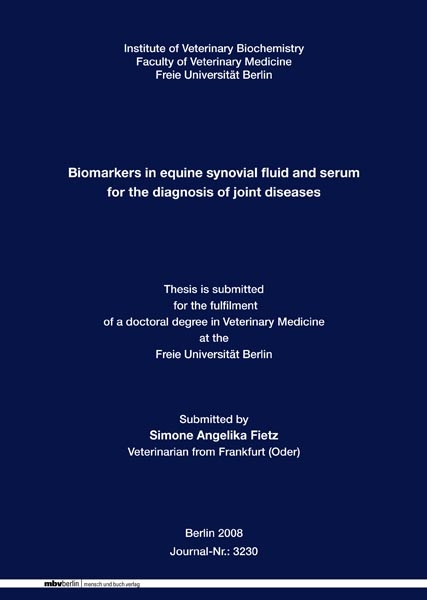
Biomarkers in equine synovial fluid and serum for the diagnosis of joint diseases
Seiten
2008
|
Aufl.
Mensch & Buch (Verlag)
978-3-86664-511-0 (ISBN)
Mensch & Buch (Verlag)
978-3-86664-511-0 (ISBN)
- Titel ist leider vergriffen;
keine Neuauflage - Artikel merken
Lameness is the most common cause of impaired athletic performance in horses. Disorders of the musculoskeletal system, particularly joint diseases represent one of the major reasons for equine lameness (CARON and GENOVESE 2003; OLIVIER et al. 1997; TODHUNTER and LUST 1992). A recent survey revealed that equine joint diseases constituted at least 30% of insured events including permanent uselessness for riding and carting between 1997 and 2006 (JÄGER C, VTV VEREINIGTE TIERVERSICHERUNG, WIESBADEN, 2007- PERSONAL COMMUNICATION). According to this, joint diseases represent not only a welfare issue but also a source of economic loss due to veterinary expenses, limited performance, and early retirements.
The diagnosis of joint diseases is routinely established on the basis of clinical lameness examination, radiography, and conventional synovial fluid analysis. Accurate clinical and laboratory assessment of joint disease is essential to determine adequate treatment and prognosis for future soundness (DAGLEISH et al. 2003). However, definite diagnosis often remains difficult. Therefore, biomarkers in body fluids have received growing attention in an attempt to improve diagnosis, assessment of disease severity, and evaluation of therapeutic effects. Due to synovial fluid being restricted to a relatively inaccessible anatomic site, and the non-routine invasive nature of its sampling, recent measurements have focused on biomarkers in serum (ELSAID and CHICHESTER 2006). Of particular interest are those biomarkers that fluctuate with a specific diagnosis, but then normalize following successful therapy. Various marker molecules have already been used successfully in research settings, but to date none have been introduced and validated in everyday horse practice. For a good assessment of joint condition, a combination of selected markers seems to be most promising (MCILWRAITH 2005).
It is therefore the aim of this study to analyse the possible use of selective parameters in equine synovial fluid and serum as potential diagnostic markers of joint diseases. The results presented here may help to refine the diagnosis of distinct joint diseases based on a multi-parameter investigation which will lay the basis for accurate
assessment of joint diseases.
The diagnosis of joint diseases is routinely established on the basis of clinical lameness examination, radiography, and conventional synovial fluid analysis. Accurate clinical and laboratory assessment of joint disease is essential to determine adequate treatment and prognosis for future soundness (DAGLEISH et al. 2003). However, definite diagnosis often remains difficult. Therefore, biomarkers in body fluids have received growing attention in an attempt to improve diagnosis, assessment of disease severity, and evaluation of therapeutic effects. Due to synovial fluid being restricted to a relatively inaccessible anatomic site, and the non-routine invasive nature of its sampling, recent measurements have focused on biomarkers in serum (ELSAID and CHICHESTER 2006). Of particular interest are those biomarkers that fluctuate with a specific diagnosis, but then normalize following successful therapy. Various marker molecules have already been used successfully in research settings, but to date none have been introduced and validated in everyday horse practice. For a good assessment of joint condition, a combination of selected markers seems to be most promising (MCILWRAITH 2005).
It is therefore the aim of this study to analyse the possible use of selective parameters in equine synovial fluid and serum as potential diagnostic markers of joint diseases. The results presented here may help to refine the diagnosis of distinct joint diseases based on a multi-parameter investigation which will lay the basis for accurate
assessment of joint diseases.
| Sprache | englisch |
|---|---|
| Maße | 148 x 210 mm |
| Einbandart | gebunden |
| Themenwelt | Veterinärmedizin ► Klinische Fächer ► Pathologie |
| Schlagworte | Hardcover, Softcover / Medizin/Veterinärmedizin |
| ISBN-10 | 3-86664-511-2 / 3866645112 |
| ISBN-13 | 978-3-86664-511-0 / 9783866645110 |
| Zustand | Neuware |
| Haben Sie eine Frage zum Produkt? |
Mehr entdecken
aus dem Bereich
aus dem Bereich
Atlas der morphologischen Zellbestimmung
Buch | Softcover (2021)
LABOKLIN GmbH & Co. KG (Verlag)
CHF 78,30


